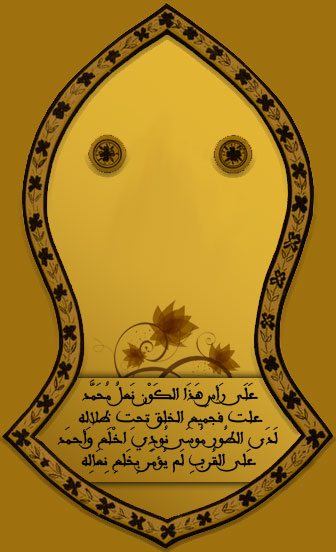Finding Peace through "The Comforter"
Article reproduced with permission from MentalHealth4Muslims by Hosai Mojaddidi
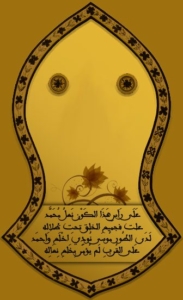 We all are familiar with the 99 names of God, but many are not aware that the Prophet (peace be upon him) had over a hundred names. The Qur’an actually lists 77 explicitly and 121 in total if you include verbs. The hadith and other ancient literature take the count of names to 333. Imam Jazuli in the Dala’il Khayrat list 201 names. And still there are other sources that suggest anywhere from 1000 to 1400 names!
We all are familiar with the 99 names of God, but many are not aware that the Prophet (peace be upon him) had over a hundred names. The Qur’an actually lists 77 explicitly and 121 in total if you include verbs. The hadith and other ancient literature take the count of names to 333. Imam Jazuli in the Dala’il Khayrat list 201 names. And still there are other sources that suggest anywhere from 1000 to 1400 names!
All of his names are beautiful and give us insight into who he is, which is why it’s important that we familiarize ourselves with them. One of his name’s that has always personally appealed to me is “The Comforter,” or the one who brings comfort. It is not among the more commonly known Arabic names because it is found in the Bible. Some people may be familiar with the Greek translation which is Paraclete or Parakletos.
There is something about the word ‘comfort’ that has universal appeal; we all love the idea of it and we want to be in comfort. Whether we’re home lounging around in our pajamas or driving almost fully reclined on our way to work, we seek comfort at every opportunity we can. Which is why we dress in comfort, we eat for comfort, we travel in comfort, we seek out relationships that make us comfortable, etc. We also need to be comforted, especially in times of hardship. No matter how strong or stoic a person may appear, they need comfort. Even the Prophet (peace be upon him) who endured so many hardships, one after the other, needed to be comforted at times.
So the idea that one of his names is actually, “The Comforter,” the one who brings comfort, just makes so much sense, especially when we look at the narrative of his life.
He has other names which are similar in meaning, like “Rahmat al `Alameen”, a mercy the worlds. God says in the Qur’an: “And We have not sent you, [O Muhammad], except as a mercy to the worlds.” (21:107)
There are also, “Rasul al-Rahma” (the Messenger of Mercy) and “Rasul al-Raha” (the Messenger of Relief).
 Seeking Comfort in Dark Times
Seeking Comfort in Dark Times
While all these names are beautiful, there’s something specifically about “The Comforter” that I find so beautiful. By the simple fact that the Prophet (peace be upon him) was given this name, it suggests to me that when we are in need of comfort, hope, consolation, solace, etc., to get through the hardships of life, we can turn to him.
We are living in very dark and perilous times. It’s evident by the injustices around the world, the violence, the poverty, the disparity between those who have and those who have not; it’s evident all around us. We’ve gone from a society where people could sleep without locking their doors and the only thing standing between them and danger was a screen door, to a world where double/triple locks, bolts, and chains are not enough to feel secure; people need full security systems like ADT or cameras strewn throughout their property to get a good night’s rest! Moreover, the world we live in now is one where children are taken from their beds while asleep, where people are kidnapped in broad daylight, where innocent women, children, and noncombatants are indiscriminately killed, raped or tortured as a consequence of unjust wars, etc. So, there is no doubt that we’re living in crazy times and that we need some type of comfort to avoid going crazy ourselves. We also need to seek comfort for our souls in order to bear life’s trials & burdens, some of which affect us every single day, like stress, health problems, financial issues, relationship issues, loss of loved ones, etc.
God, in His infinite mercy, gave us a very real and tangible solution; He gave us someone we could identify with, someone we could learn from, someone we could find comfort in. He gave us “The Comforter” (peace be upon him). Which is why in addition to praising the Prophet Muhammad (peace be upon him), loving him more than we love our own souls, and feeling an incredible amount of indebtedness to him, we should also actively seek and find comfort in him, his existence, his creation, his words, his example, etc. Everything about him and his life was made with this intent, to bring us comfort and relief. So when we feel the weight of the world on our shoulders, the burdens of the rat race of life we’re all caught up in, we should literally be able to breathe a sigh of relief just thinking about him and imagining him. Indeed, just reading his biography, and learning from the lessons of his life, there is something that every single soul on earth can find comfort in.
 How Can We Seek Comfort in Him?
How Can We Seek Comfort in Him?
1) He was an orphan. God, in His infinite wisdom, made him an orphan. Let us think about this for one moment and just imagine the millions of displaced, disenfranchised, impoverished souls throughout history who were either orphaned at birth or separated from their families. There’s no possible way to quantify those numbers throughout history but looking at the most current statistics UNICEF estimates the number of orphans at 210 million in the world today.
86 million orphans in India – more than the ENTIRE population of countries like Egypt & Turkey
44 million orphans in Africa by 2010
10 million orphans in Mexico
So, let’s think of these 210 million orphans throughout the world as well as the millions if not billions of people alive today who are in living in destitution, in absolute poverty or under oppressive regimes and let’s think of what it would mean to them to know that the most Beloved of God (peace be upon him) was also an orphan, was also poor and lived in that state up until his last and final breath!
Let’s also think of what it would mean to them to know what he himself said about the orphan:
“If anyone caresses an orphan by moving his fingers in his hair, doing so only for God’s sake, he will have blessings for every hair over which his hand passes and if anyone treats well ail orphan girl or boy under his care, he and I shall be like these two in Paradise,” putting two of his fingers together. (Ahmad)
There are 3 billion people right now, which is roughly 50% of the world population, who live on less than $2.50 a day. Let’s imagine what it would mean to them to know that he lived in extreme poverty, and that he too experienced famine and drought as they do, and that he starved like they do.
Let us imagine how much “comfort” all of these innocent and destitute souls would find in “The Comforter”, if only they knew, if only they knew!
2) He experienced loss in such degrees that most of us would literally lose our minds if we went through the same. There are people alive today who fall apart and go off the rails when their cars get scratched, their Louis Vuitton purse gets a stain on it, or they lose their Chanel glasses. There are thousands of people who are so attached to their possessions they are in therapy right now, some even on medication.
Then we have the Prophet (peace be upon him) who experienced unimaginable loss. He never met his father and lost his beloved mother at just 6 years old; he also lost his grandfather, his beloved uncles, the love of his life, Lady Khadija (may God be pleased with her), and his children! Out of 6 children he had to bury 5 of them himself! That is every parent’s nightmare and he experienced it not once but 5 separate times. His daughter Fatima (may God be pleased with her) is the only child who outlived him.
Let us just imagine for a moment any parent who has ever suffered the loss of a child, whether through war, disease, hunger, accident or otherwise, or any woman who has had a miscarriage, and let us imagine how they would feel if they knew the details of his life. Imagine if they knew that the Beloved of God (peace be upon him) understood their pain multiplied by 5. Think of how much “comfort” they would find in “The Comforter,” if only they knew!
3) He suffered by experiencing self-doubt when he first received the revelation and then by being mocked, tortured, ridiculed, ostracized by his own people. So for anyone who has ever been bullied or suffered through low self-esteem, imagine that the Beloved of God (peace be upon him) even after experiencing and witnessing with his own eye some of the most extraordinary things that have ever happened in this world doubted himself and doubted his abilities to succeed.
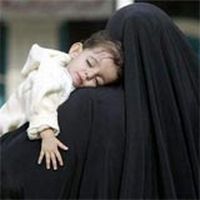 Let us think of all the kids out there every day who are ridiculed at school (1 in 7 kids, nearly 200,000, miss school every single day because of fear of being bullied), or people who are constantly mocked by their peers, family members, co-workers, and who suffer deep anxiety as a result, etc. Anxiety disorders are actually the most common mental health issue in this country affecting 40 million adults. So, let us imagine all the people out there who are on medication, including millions of young children! And let us remember that there are people walking around every day amongst us, they work with us, go to school with us, come to the masjid with us who have suicidal thoughts because they suffer this way: they are anxious, they have self-doubt, they’ve been ridiculed, ostracized, etc…for what? For simply being different than the status quo.
Let us think of all the kids out there every day who are ridiculed at school (1 in 7 kids, nearly 200,000, miss school every single day because of fear of being bullied), or people who are constantly mocked by their peers, family members, co-workers, and who suffer deep anxiety as a result, etc. Anxiety disorders are actually the most common mental health issue in this country affecting 40 million adults. So, let us imagine all the people out there who are on medication, including millions of young children! And let us remember that there are people walking around every day amongst us, they work with us, go to school with us, come to the masjid with us who have suicidal thoughts because they suffer this way: they are anxious, they have self-doubt, they’ve been ridiculed, ostracized, etc…for what? For simply being different than the status quo.
Now imagine, how these people would feel if they knew the details of the blessed life of the Prophet (peace be upon him). Imagine if they knew that he experienced the same emotions as they do, that he too went through a period of self-doubt and uncertainty! Think of how much “comfort” they would find in “The Comforter,” if only they knew!
4) In addition to suffering himself, he also removed the suffering of others by showing them compassion and mercy when others condemned them. Think of the man who urinated in the mosque and how the Prophet (peace be upon him) was able to dignify him even though he was doing the most undignified of acts.
We can only imagine what would happen if someone urinated in a mosque today. I’m pretty certain no one would just let him finish the act. That’s exactly how the Prophet (peace be upon him) handled the situation.
After the incident, the man said about the Prophet (peace be upon him): “May my mother and father be sacrificed for him. He did not scold or insult me. He just said, ‘We do not urinate in these mosques-they were built for prayer and remembrance of Allah.’ Then he called for a bucket of water to be poured on the ground.” — (Ibn Majah)
Sadly, we’ve become extremely unforgiving of people when they make mistakes. And that’s the irony, the more distant from God we’ve become as a community, the more intolerant we’ve become of others!
So imagine anyone who has perhaps embarrassed themselves by doing something “undignified” in their lives. And we all know someone, perhaps a relative or friend who has had some very low points and come under fire by others for behaving inappropriately; think of the drunk uncle at the wedding who is stumbling all over himself or offends a guest by speaking out of line. It doesn’t even have to be an extreme situation like that, it can be anyone who’s ever made a mistake in front of others and lived to regret it. Now imagine how when these people have suffered from the scrutiny, judgement, and intolerance of those around them, how they would feel to know that in the presence of the Beloved of God (peace be upon him) they would never be shamed! Imagine how much “comfort” they would find in “The Comforter,” if only they knew!
5) Think of Zahir bin Haram, who was a poor bedouin who often visited the Prophet (peace be upon him) and would bring him gifts. He was known for his poverty and for not being very attractive. One day he came to visit the Prophet (peace be upon him) but he didn’t find him so he went to the marketplace to sell his merchandise. When the Prophet (peace be upon him) heard Zahir was in town he went to find him and saw him disheveled, with tattered clothing and sweat pouring down his face. The Prophet (peace be upon him) came up from behind him and startled, Zahir began to shout, ”Who is this? Let me go! Let me go!” As soon as he realized it was the Prophet (peace be upon him) he instantly calmed down.
Then the Prophet (peace be upon him) teased him and said to the crowd gathered around: “Who will buy this slave?! Who will buy this slave?!” Zahir then looked at himself and thought of his extreme poverty, for he had neither wealth nor good looks and he said: “You will find me unmarketable, O Messenger of God.”
The Prophet (peace be upon him) said: “But you are not unmarketable with God. You are very precious to God!”
Now let’s think of every single person who has ever looked down at themselves for not being attractive enough or for not having enough wealth. Think of the millions of girls & boys out there who are starving themselves (up to 24 million people of all ages and genders suffer from an eating disorder, including anorexia, bulimia and binge eating disorder in the U.S.). Think of all the people out there fueling the billion dollar cosmetics industry to try to cover up their acne scars, lighten their skin, hide their cellulite, etc., or the guys who are taking steroids, hair loss pills, and who are lying about their salaries or running thousands of dollars in debt to live beyond their means because they’re insecure of how much they have.
Now, imagine how much comfort they would find in Zahir’s story, to know that one can be precious to God even if the rest of the world finds you have little value. Imagine how much “comfort” they would find in “The Comforter,” if only they knew!
6) Imagine all the women out there who are divorced/widowed or think they are too old or too heavy or too tall to be married and think of Sawdah (may God be pleased with her).
She was old, she was a widow, she was tall and heavy set, and she was not very attractive. After Lady Khadija (may God be pleased with her) passed away the Prophet (peace be upon him) was asked about marrying Sawdah. He was also asked about Aisha (may God be pleased with her) who was young and beautiful. He chose to marry Sawdah over Aisha.
So for all the sisters out there who are older and unmarried and feel conscious about their weight or their looks, just imagine how much honor his marriage to Sawdah gives you. After all, if the Best of Creation (peace be upon him) chose someone who looks like you or has a similar circumstance as you, then who is anyone else to demean you or make you feel unworthy?!
7) In many cultures across the world, you are shamed if you do not bear sons and only have daughters. Imagine how much comfort it brings to those men and women who are treated as outcasts or looked down upon to hear that the Prophet (peace be upon him) said, “Whoever raises two girls till they come of age, will be in the next world along with me, like my two fingers joining each other.” (Abu Dawud)
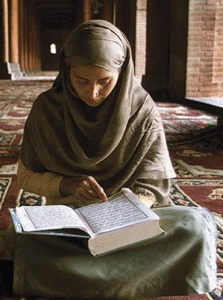 8) One billion people in the world are illiterate. We know the Prophet (peace be upon him) was unlettered, but he was also the most brilliant and intelligent man to ever live and who ever will live. So, think of the billions of people who have never read a book in their lives and what it would mean to them to know that one can still be great without having the ability to read or possessing an education or degree.
8) One billion people in the world are illiterate. We know the Prophet (peace be upon him) was unlettered, but he was also the most brilliant and intelligent man to ever live and who ever will live. So, think of the billions of people who have never read a book in their lives and what it would mean to them to know that one can still be great without having the ability to read or possessing an education or degree.
9) Every day, there are millions of children who are emotionally, verbally, and physically abused. Many of them come from seemingly “normal” families but are spoken down to, neglected & disrespected every day. Their parents have no qualms whatsoever punishing them and humiliating them in private and in public. When they go to gatherings where there are adults, sometimes they are ignored completely. Imagine how these children would feel to know that the Beloved of God (peace be upon him) was known to love children. He would go out of his way to say salam to them, he would sit with them, and play with them.
We all need to ask ourselves, when was the last time we went out of our way to say salam and talk to a child? When was the last time we really spoke with them & gave them a sense of importance without any expectations from them at all? Sure, we can engage them when we need them to run and get us something from the other room or worse we pretend to engage them but we’re just nodding our heads while we’re distracted with our phones, computers, etc. And this doesn’t just apply to our own children, but to our extended families, our nieces, nephews, cousins, the children of our dearest friends and community members, etc. Do we really make an effort to put a smile on a child’s face in the same way the Prophet (peace be upon him) did?
He not only did that but he would play with them as well. He used to line up some kids in a row and say, “I’ll give such and such (i.e gift or so) to the one who comes running back to me first.” So they used to race and fall on his back and chest. (Ahmad)
Sadly, many of us are so busy these days, we don’t have time for our own kids let alone someone else’s. Yet we have to look at the example of the Prophet (peace be upon him) and wonder, “Is anything I am doing more important than the weight that was placed on his shoulders?” He made time to honor children, so we really have no excuse, do we?
Think of how these beautiful examples gives importance, honor, and dignity to every child in the world. And think of all the forgotten and neglected children and how much comfort they would find in the “The Comforter,” if only they knew!
Conclusion
All of these examples give us great insight into who the Prophet (peace be upon him) was and what he carefully, methodically, and so beautifully tried to teach all of us. We have to marvel at the fact that one man was created and fashioned to such perfection that he literally has universal appeal and that anyone…man, woman, child, can relate to him. We also have to wonder at the irony that while he was among the poor and illiterate, he was simultaneously the greatest leader to ever live! He was never at a disadvantage to anyone and yet he understood the disadvantaged! These are clear signs of the perfection of his creation!
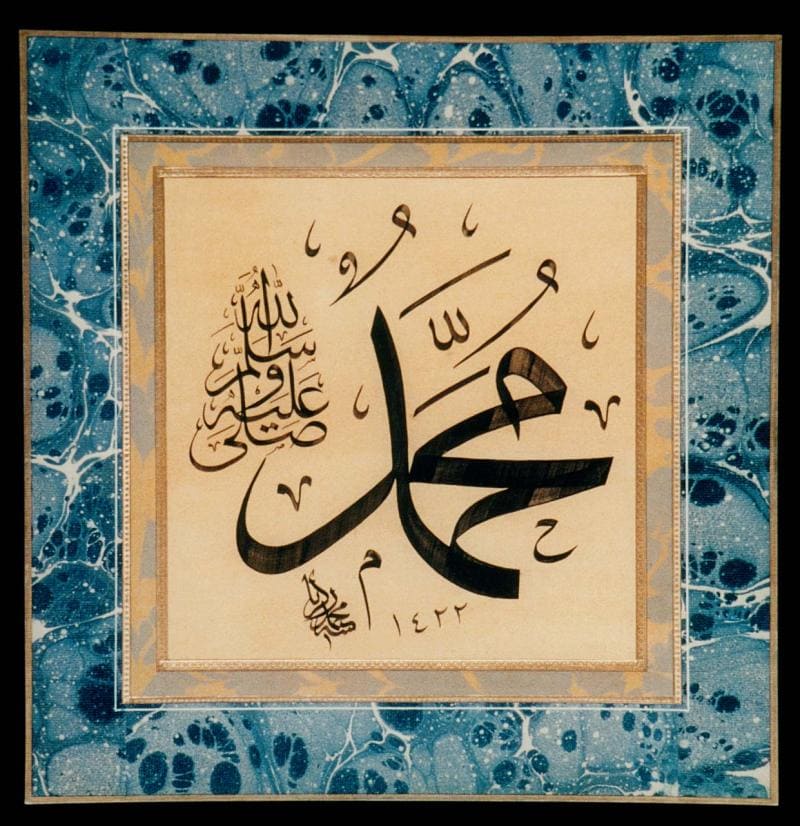 Finally, the degree and amount of comfort that we can find in the life of the Prophet (peace be upon him) doesn’t even stop with these beautiful examples from his life. He provides us comfort daily in real time when we reflect on the fact that we have been promised his intercession on the Day of Judgement:
Finally, the degree and amount of comfort that we can find in the life of the Prophet (peace be upon him) doesn’t even stop with these beautiful examples from his life. He provides us comfort daily in real time when we reflect on the fact that we have been promised his intercession on the Day of Judgement:
“Allah gave me the option of choosing between the power of intercession or having half of my Ummah admitted to Paradise without any reckoning. I chose the power of intercession because that is more important and will be more useful. Do you assume that my intercession is for the pious Muslims? No, on the contrary, it is for those sinners who are steeped in sins and have committed grave crimes.” [Imam Ahmad in his Musnad from Hadrat Abdullah ibn Umar. Ibn Maja from Hadrat Abu Musa Asha’ari]
But all of the comfort we acquire from the life and example of the Prophet (peace be upon him) is only possible because our Lord is the most-Merciful of the Merciful. He, without any doubt, knows what we need before we even know we need it. He knew that this ummah would suffer, whether we’re in Palestine, Egypt, Syria, Afghanistan, Sudan, Europe, the U.S., or scattered throughout the world, He knew we would need solace to make sense of it all and so He gave us “The Comforter”. He gave us his life and example to learn from, so that we know how to respond to life’s trials and tests.
The challenge before us is, do we really know “The Comforter”? Have we truly studied his example and followed the course he has set forth for us? Do we truly know his value?
If only we knew….
On the Importance of Mental Health Support
As outlined above, the Prophet (peace be upon him) provided us countless examples to guide our life with which promote mental health and wellbeing. In fact, he fulfilled a vital role for his community during his lifetime by fulfilling their needs for mental health support. Many of his companions and community members would seek his guidance and counsel about every day worldly affairs. So, as a community we need to recognize the importance of and promote mental health support in this way; we need to accept that some people may need more support beyond prayer and reflection and encourage them to seek help and guidance from trained mental health professionals.
